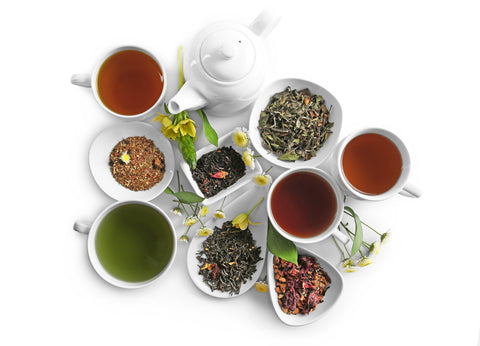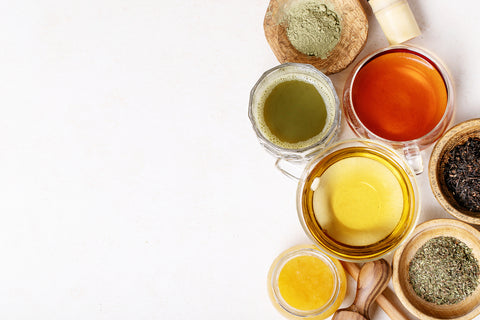Tea is the second most consumed beverage worldwide (just behind water) and has been consumed for centuries —& for good reason, too!
Different types of teas have different health benefits, with each variety of tea offering a unique blend of antioxidants, vitamins, and other compounds that may positively impact your health and well-being.
Keep reading to learn more about different types of teas, the top healthiest teas, and their unique health benefits.

What is the brief history of tea?
Tea has a vibrant and long history. Legend says that we can trace the story of tea back to a Chinese emperor, Shen Nung, in 2737 BC. Shen Nung was supposedly waiting for his servants to boil him drinking water when the leaves of the tree he was sitting under fell into the hot water. The emperor was a well-known herbalist who tried the beverage; thus, the tea concept was born.
However, Indian lore gives credit to Prince Bodhi-Dharma. The prince was an Indian saint who founded the Zen school of Buddhism. It is said that he vowed to meditate for nine years without sleeping, but he fell asleep towards the end of the nine years. When he woke, he was so distraught that he cut off his eyelids and threw them on the ground- legend says that a tea plant sprung up as a testament to his sacrifice.
Lore aside, the first true recording of tea is as a medicinal beverage in China around the 3rd century. The concept of tea quickly spread around the globe by merchants and was popularized as an afternoon beverage in Great Britain in the 19th century.
A Guide to Different Types of Common Teas and Their Benefits:
Green Teas
Popular types of green tea include matcha, sencha, gunpowder green, hojicha, and genmaicha
Green tea comes from the plant Camellia sinensis. Leaves and buds are removed and left to slightly whither, then are immediately cooked and preserved. This process helps prevent oxidation and gives green tea its color.
While all varieties of green tea come from camellia sinensis, different tea varieties undergo various processes, giving the tea its unique flavor profiles, colors, and benefits.
For example, to make matcha in Japan, the plant is shaded its last few weeks before harvest, then the youngest leaves are picked, processed, and ground into a very fine powder.
Learn more about how matcha is made and what it tastes like.
Green tea is high in catechins- an antioxidant that may help reduce oxidative stress. Studies also show that catechins may be able to limit cell damage. EGCG, the most researched catechin in green tea, is believed to be helpful for specific health conditions and diseases.
In addition to the beneficial antioxidants green tea contains, some studies show that drinking green tea may help with cognitive function and stress management. Green tea contains L-theanine, which is known as the relaxing amino acid. Studies show that L-theanine may help ease anxiety and stress as well as improve focus.
Learn what variety of teas are highest in l-theanine here.
Green tea has also been studied for increasing metabolism, speeding up weight loss, protecting the brain from age-related diseases, and managing healthy blood sugar levels.
Learn about the benefits of drinking matcha tea while pregnant.
White teas
Common white teas include Darjeeling white, Ceylon white, white peony, and silver needle.
White tea is also made from the leaves of Camellia sinenesis and is considered the most delicate tea as it’s the least processed tea (compared to green and black teas). Leaves and buds are harvested just before they are fully mature when they are still covered in fine white hairs, which is what gives white tea its name.
Leaves and buds are handpicked and quickly dried to minimize oxidation. It’s thought that because of this process, white tea contains a higher number of antioxidants.
Studies show that white tea has antioxidant benefits similar to green tea and is packed with polyphenols. One test-tube study found that white tea may effectively reduce inflammation and free radicals because of the high polyphenol content.
Although more studies are needed, the polyphenols in white tea may also boost immunity and reduce the risk of heart disease.
White tea also appears to be as effective as green tea in helping with weight loss and may be able to boost metabolism by an extra 4-5%.
Learn more about matcha tea for weight loss here.

Black teas
Black tea varieties include Earl Grey, Darjeeling, English and Irish breakfast tea, and Ceylon.
Black tea comes from the same plant as white and green tea, Camellia sinensis. However, it is much more oxidized than green or white tea, which gives it its dark hue and hearty flavor. Leaves are harvested, wilted, lightly crushed, and fully oxidized before being dried and packaged. Because of this process, black tea has a more robust flavor and often more caffeine.
Similar to green and white tea, black tea also contains antioxidants, which provide a range of benefits and may decrease the risk of developing some chronic diseases. Black tea is especially high in a group of polyphenols, which include catechins, theaflavins, and thearubigins.
Some interesting studies show the potential of theaflavins and thearubigins to reduce cholesterol and support healthy blood sugar levels.
Black tea also contains another group of antioxidants referred to as flavonoids. Flavonoids can also be found in fruits, vegetables, red wine, and chocolate and have been studied for being beneficial for heart health, high blood pressure, high cholesterol, and even obesity.
The high quantity of polyphenols in black tea may even support a healthy gut microbiome. Having a healthy gut has been connected to lower levels of IBS, diabetes, heart disease, and even cancer. Overall, gut health is critical for overall health. One study showed that black tea might help promote the growth of good bacteria over harmful bacteria.
Consider drinking organic Japanese black tea.
Herbal teas
Herbal teas may include chamomile, hibiscus, peppermint, ginger, lemon balm, and rosehip.
Herbal teas have been used for centuries for their health-promoting qualities. There is a huge variety in herbal teas and how they are prepared, but they are typically made with either fresh or dried flowers, leaves, roots, seeds, or fruit.
Boiling water is then often poured over the desired plant part and left to steep for a few minutes. Since there is such an extensive range of herbs used to make tea, there is also a huge variety of taste and health benefits.

Chamomile is known for being calming and relaxing and is frequently used as a sleep aid. Some research also shows that chamomile is an ant-bacterial and anti-inflammatory.
Mint, such as peppermint and spearmint, is commonly used as a digestive aid and is thought to reduce stomach pain, IBS symptoms, and nausea. It's also a wonderful choice of tea while pregnant.
Ginger tea is a powerful source of antioxidants and may improve immune health and help with nausea. There is also some research that shows ginger tea may help address stomach ulcers, PMS, and support overall gut health.
Learn about the potential health benefits of Japanese black ginger tea here.
Echinacea is commonly used to prevent and treat the common cold, and there is some research to back up echinacea as an immune booster.
Rosehip is high in vitamin C and is thought to be an anti-inflammatory. Limited research points to rosehip being beneficial for addressing symptoms of rheumatoid arthritis and osteoarthritis.
Overall, there is a vast variety of herbal teas, which differ in flavor and benefits. However, remember that herbs can impact medications and certain medical conditions, so it’s always important to check with your medical provider.
Chai tea
Chai translates to “tea” in Hindi and is typically made with a base of black tea, Assam being the most popular. Recipes vary drastically, but traditional ingredients for chai include black tea mixed with strong spices like cinnamon, cardamom, cloves, ginger, and pepper. This spiced tea mixture is then brewed with milk and sweetened with honey or sugar.

Due to the black tea and added spices, chai may be able to claim many health benefits. One is heart health. Some animal studies show that cinnamon (a common ingredient in chai) may lower blood pressure and have the potential to reduce cholesterol and triglycerides.
Cinnamon may also be beneficial in increasing insulin sensitivity and lowering blood sugar. It is important to note, though, that the amount of cinnamon that was shown to be helpful is more than what would be found in a traditional cup of chai.
Ginger, found in chai, may help reduce nausea and soothe an upset stomach when you are experiencing digestive discomfort.
Learn about 18 well-studied health benefits of chai tea.
Yerba mate
Yerba Mate is a traditional South American tea made from dried yerba mate (ilex paraguariensi) leaves- an evergreen shrub related to holly. It is traditionally served in a calabash gourd with a metal straw (bombilla).
Yerba mate is rich in antioxidants and several other beneficial compounds, including xanthines, caffeoyl derivatives, and saponins. It’s believed that the antioxidant content of mate is similar to that of green tea.
Mate is thought to help increase energy levels due to its caffeine content (similar to a cup of coffee). Research suggests that caffeine may even help improve athletic performance by up to 5% by improving muscle contractions and possibly reducing fatigue.
Some studies also show that yerba mate can support weight management and may be helpful in weight loss and reducing belly fat.
Learn more about other caffeine alternatives to coffee and yerba mate.
Rooibos tea
Rooibos, also known as red tea, comes from an herb native to South Africa. Traditional rooibos tea is made from fermenting the leaves, which is responsible for their beautiful red color. The leaves are then then brewed with hot water.
Rooibos is packed full of antioxidants, including aspalathin and quercetin. Quercetin has been shown, in older studies, to kill cancer cells and prevent tumor growth.
Aspalathin may also help balance blood sugar levels, which could be promising for people with type 2 diabetes. Overall, however, more human studies are needed.
Some studies suggest that rooibos may benefit heart health -- showing that the tea may help lower blood pressure and cholesterol levels. Although, again, more studies are needed.

The bottom line | Try different types of teas to experience a range of health benefit
Tea, in its rich variety, offers an array of health benefits. Each cup provides a unique flavor and benefits, from the antioxidative power of green teas to the invigorating qualities of black tea and the diverse array of herbal infusions.
Tea has been shown to bolster immunity, provide sustained energy, balance blood sugar, lower cholesterol, and improve overall health. No matter which tea you choose, enjoy each sip and know that you are serving your body well.
Think there is more teas or information we should add to our guide on different types of tea? We'd love to hear from you! Email us at Support@matcha.com
You may also like:
The health benefits of turmeric
Could drinking matcha help fertility?
Disclaimer: These statements in this blog post have not been evaluated by the Food and Drug Administration. The information provided here is for educational purposes only and should not be considered as medical advice. It's essential to consult with a qualified healthcare professional before making any dietary or lifestyle changes.
References:
Baba, Y., Inagaki, S., Nakagawa, S., Kaneko, T., Kobayashi, M., Takihara T. Effects of l-Theanine on Cognitive Function in Middle-Aged and Older Subjects: A Randomized Placebo-Controlled Study. J Med Food. 2021 Apr;24(4):333-341. doi: 10.1089/jmf.2020.4803. Epub 2021 Mar 22. PMID: 33751906; PMCID: PMC8080935.
Braz, J., The anti-obesity potential of ilex paraguariensis: results from a meta-analysis. Braz. J. Pharm (2019), 55, https://doi.org/10.1590/s2175-97902019000217615
Hursel, R., & Westerterp-Plantenga, M. S. (2010). Thermogenic ingredients and body weight regulation. International journal of obesity (2005), 34(4), 659–669. https://doi.org/10.1038/ijo.2009.299
Imran, A., Butt, M. S., Arshad, M. S., Arshad, M. U., Saeed, F., Sohaib, M., & Munir, R. (2018). Exploring the potential of black tea-based flavonoids against hyperlipidemia-related disorders. Lipids in health and disease, 17(1), 57. https://doi.org/10.1186/s12944-018-0688-6
Khan, N., & Mukhtar, H. (2018). Tea Polyphenols in Promotion of Human Health. Nutrients, 11(1), 39. https://doi.org/10.3390/nu11010039
Mouria, M., Gukovskaya, A. S., Jung, Y., Buechler, P., Hines, O. J., Reber, H. A., & Pandol, S. J. (2002). Food-derived polyphenols inhibit pancreatic cancer growth through mitochondrial cytochrome C release and apoptosis. International journal of cancer, 98(5), 761–769. https://doi.org/10.1002/ijc.10202
Musial, C., Kuban-Jankowsk, A., Gorska-Ponikowska, M. Beneficial Properties of Green Tea Catechins. International Journal of Molecular Science. 2020 Mar; 21(5): 1744.
Peluso, I., & Serafini, M. (2017). Antioxidants from black and green tea: from dietary modulation of oxidative stress to pharmacological mechanisms. British journal of pharmacology, 174(11), 1195–1208. https://doi.org/10.1111/bph.13649
Rao, P. V., & Gan, S. H. (2014). Cinnamon: a multifaceted medicinal plant. Evidence-based complementary and alternative medicine: eCAM, 2014, 642942. https://doi.org/10.1155/2014/642942
Schmid, R., Schick, T., Steffen, R., Tschopp, A., & Wilk, T. (1994). Comparison of Seven Commonly Used Agents for Prophylaxis of Seasickness. Journal of Travel Medicine, 1(4), 203–206. https://doi.org/10.1111/j.1708-8305.1994.tb00596.x
Thring, T. S., Hili, P., & Naughton, D. P. (2011). Antioxidant and potential anti-inflammatory activity of extracts and formulations of white tea rose, and witch hazel on primary human dermal fibroblast cells. Journal of Inflammation (London, England), 8(1), 27. https://doi.org/10.1186/1476-9255-8-27
Wan, M. L. Y., Co, V. A., & El-Nezami, H. (2021). Dietary polyphenol impact on gut health and microbiota. Critical reviews in food science and nutrition, 61(4), 690–711. https://doi.org/10.1080/10408398.2020.1744512
Xu, R., Bai, Y., Yang, K. et al. Effects of green tea consumption on glycemic control: a systematic review and meta-analysis of randomized controlled trials. Nutr Metab (Lond) 17, 56 (2020). https://doi.org/10.1186/s12986-020-00469-5







